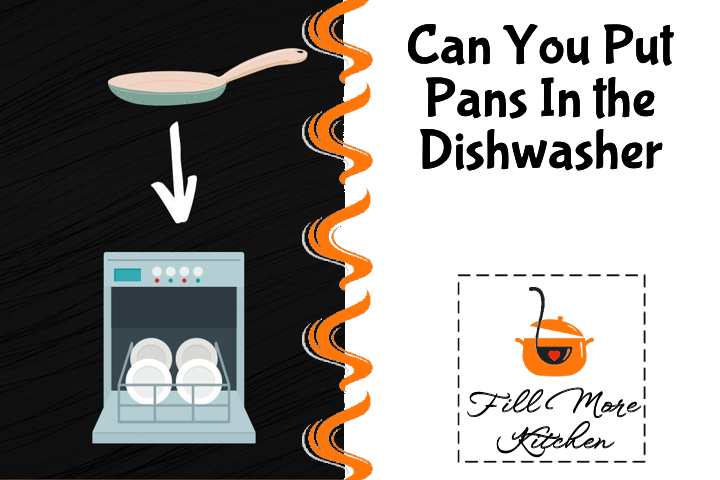Although you may prefer washing dishes manually, it can be tempting to use the dishwasher for sticky, greasy, and difficult-to-handle pans. However, due to the different materials and types of pans, this can create a dilemma as to whether or not you are damaging your cookware by relying on the dishwasher.
Unless the manufacturer indicates otherwise, it is generally not recommended to wash pans in the dishwasher as it can be unsafe. However, pans made of stainless steel and glass are capable of withstanding hot water and strong cleaning agents and can be safely cleaned using a dishwasher. On the other hand, cast iron, copper, and nonstick pans should not be washed in the dishwasher due to their finishes.
While there is no universal solution for every pan in your kitchen, cleaning methods are generally similar, but each material requires specific tips and techniques to maintain the longevity of your cookware.
What Type Of Pans Can You Put In the Dishwasher?
Although stainless steel and glass pans used for baking can be washed in the dishwasher, the heat and chemicals used may still cause damage to their finishes. To prevent damage, manufacturers advise hand washing for other materials like cast iron, aluminum, and nonstick coated pans.
While stainless steel is typically dishwasher-safe, it’s important to inspect the hardware like pins and screws for any signs of moisture after running a cleaning cycle and dry them manually to prevent rust.
If you want to maintain the pristine condition of your glass dishes, it is advisable to hand wash them as the harsh chemicals used in dishwashers can cause dullness on their surface.
While it is generally advisable to wash aluminum pans by hand, they can be put in the dishwasher if there is a confirmation mark on the pan.
Aluminum may lose its shine due to the chemicals present in dishwasher detergent, hence it is advisable to switch between manual washing and machine washing.
If you choose to put pans in the dishwasher, it is important to keep in mind that this material can be easily scratched. Therefore, it is recommended to place them separately from other dishes and utensils to prevent any potential damage.
Pans composed of ceramic, cast iron, or coated with a nonstick substance must not be placed inside the dishwasher as it will cause them to deteriorate and render them useless in no time.
How Do You Know If a Pan Is Dishwasher Safe?
Usually, pans used on the stovetop have a marking on the handle that specifies whether it is suitable to be cleaned in the dishwasher; if not found there, it might be present on the pan’s underside.
Baking pans and dishes frequently have markings such as engraving or stamps that indicate their material composition and proper cleaning instructions, typically located at the center of the dish’s bottom.
Manufacturers use different symbols to show if pots and other dishes are safe to be washed in the dishwasher. Usually, a square with a basic illustration of plates, utensils, or glasses is included along with an indication of water like drops or slash lines.
Other symbols indicate that the pan is safe to be washed in a dishwasher, with some manufacturers providing further instructions on whether to place it on the top or bottom rack.
When there are no clear markings on your cookware, relying on common sense can be useful. If the pans have any type of coating, such as nonstick, exposing them to the high temperature of a dishwasher can cause damage and render them hazardous for future use.
If you are still unsure whether your pan can be washed in the dishwasher, you can check the cleaning instructions provided by the manufacturer on their website. Simply search for the brand of your pot, and you should find the answer easily.
Do You Put Pans In the Dishwasher’s Bottom or Top Drawer?
If you want to clean your pots, pans, and casserole dishes in the dishwasher, it is recommended to place them on the lower rack. This ensures that the water and detergent can reach all sides of the cookware.
It is crucial to observe the distribution of water and detergent in your dishwasher, as most machines have a comparable system for cleaning and rinsing dishes, but it is essential to understand how your specific system operates.
To ensure proper functioning of the sprayer, position big items like pots and pans on the sides of the lower rack as placing them over the sprayer may hinder water and detergent from reaching all the dishes.
It is important to avoid overloading the dishwasher as it can hinder proper cleaning, therefore, make sure to either space out larger items or run multiple loads.
Will a Dishwasher Damage Pans Immediately?
While certain materials can withstand the harsh conditions of a dishwasher and remain intact, others may not be able to endure the high temperatures and potent cleaning agents.
Cast Iron pans are not suitable for cleaning in the dishwasher and should not be washed with soap, even when washing by hand, as it can remove the seasoning that provides Cast Iron with its unique cooking properties.
Putting pans with nonstick coating in the dishwasher can lead to the removal or harm of the coating, and other items in the dishwasher may scratch it as well. It is not advisable to use pans with scratched nonstick coating as it could be linked to health issues.
Aluminum may lose its shine and get scratched easily when washed in the dishwasher. Additionally, it can develop a dark, powdery coating due to oxidation, which can spread to other dishes as well.
Aluminum is a common material used in disposable pans, and although they can be reused, exposing them to the dishwasher’s forceful water jets will cause them to become misshapen and distorted.
Copper pans can lose their shine rapidly, and it may be impossible to bring back their former luster. As costly display items, copper pans should always be cleaned manually.
How To Wash Pans That Can’t Go In the Dishwasher
The safest way to wash most pans is by using dish soap, warm water, and a nylon sponge. Soaking for about 20 minutes can help loosen up stubborn spots if there are a lot of stuck-on food particles, except for cast iron pans. To prevent rust and water spots, it’s essential to dry the pans immediately after washing.
Below are some suggestions for different types of pans:
If you have stainless steel pans, you can clean them effectively by using hot soapy water and a regular kitchen sponge. In case of stubborn food particles, you can apply some drops of olive oil on the affected area and rub it with a paper towel until it comes off.
Aluminum is best cleaned with a basic soap and water solution, and for stubborn stains, a green sponge or fine grade steel wool can be used in a back-and-forth motion to prevent any damage.
It is important to handle nonstick pans with caution because the coating can easily get scratched. These types of pans should be washed individually in the sink, and it is crucial to avoid using any abrasive materials on their nonstick surface.
Copper cookware can be washed by hand using regular dish soap, but it’s important to avoid using abrasive materials that could scratch the shiny surface. If you notice any discoloration on the copper, you can create a solution of ¼ cup white vinegar and 2 tablespoons of salt. Gently rub this mixture onto the copper surface using a soft sponge to restore its brightness.
Cast Iron pans should not be soaked in water as they rust quickly, and soap should not be used on them because it removes the seasoning that has accumulated due to their porous nature.
To avoid damaging cast iron pans, it is recommended to use a stiff brush, plastic scrubby, or green sponge to remove debris, and reserve the use of steel wool for removing rust from a pan that will be re-seasoned after cleaning.
Simply fill a sink with hot water and scrub away the dirt, rinsing frequently. Make sure to thoroughly dry your cast iron by heating it on the stovetop and then wiping it down with a towel before applying a thin layer of oil. For more information on how to restore your cast iron, check out this article.
If you want your pan to last as long as possible, it’s important to clean it properly, which usually involves handwashing with a few exceptions.
To ensure proper care of your cookware, it is recommended to carefully read and save any relevant care instructions provided by the manufacturer when purchasing a new pan.
You can also check this video about “Can You Put Pans In the Dishwasher?”
Check out our top 10 reviews!
Related posts
https://fillmorekitchen.com/is-a-toaster-oven-safe-under-a-cabinet/
https://fillmorekitchen.com/food-that-starts-with-the-letter-c/
https://fillmorekitchen.com/do-dishwashers-use-a-lot-of-water/
https://fillmorekitchen.com/how-to-keep-a-bagel-with-cream-cheese-fresh/
https://fillmorekitchen.com/can-you-touch-food-after-using-hand-sanitizer/



